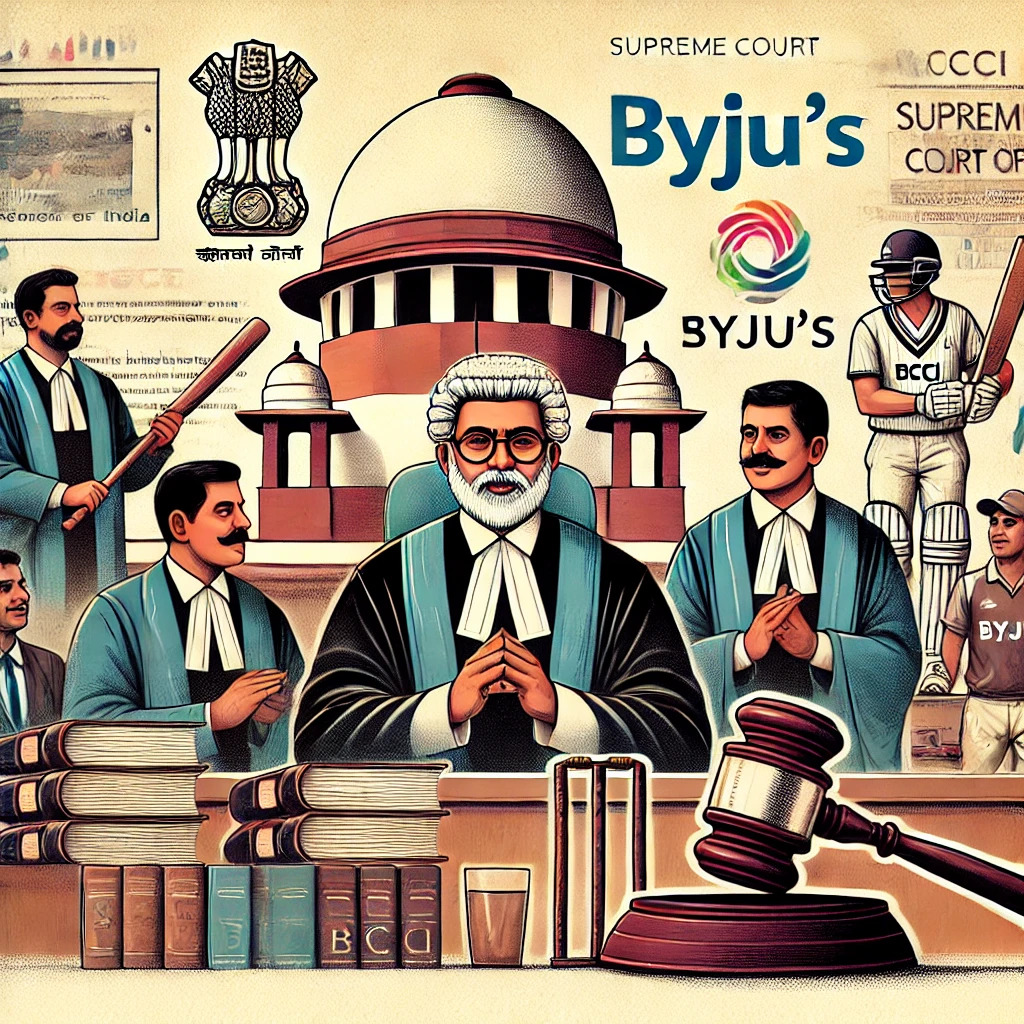View News
Byjus-Payment-Dispute-Settlement-Overturned-by-Supreme-Court-of-India

Byju's Payment Dispute Settlement Overturned by Supreme Court of India
Introduction In October 2024, the Supreme Court of India delivered a landmark judgment invalidating a settlement agreement between Byju’s, India’s leading ed-tech firm, and the Board of Control for Cricket in India (BCCI). The dispute centered around Byju’s unpaid sponsorship dues to BCCI. The apex court ruled that the agreement was legally untenable since it bypassed the company’s insolvency resolution process, emphasizing that such settlements must go through the company’s insolvency administrator and the National Company Law Tribunal (NCLT). This ruling sets a significant precedent for handling financial disputes involving insolvent companies.
Background of the Dispute Byju’s, which had been an official sponsor of the Indian cricket team, faced financial difficulties in 2023 due to liquidity issues and mounting debts. The company had reportedly failed to clear its sponsorship dues to BCCI, leading to legal action by the cricketing body. As part of an out-of-court resolution, Byju’s and BCCI entered into a settlement agreement wherein Byju’s committed to paying the dues over a stipulated timeline.
However, Byju’s financial woes deepened, leading to its initiation of insolvency proceedings under the Insolvency and Bankruptcy Code (IBC), 2016. Despite this, the settlement agreement with BCCI was executed without obtaining approval from the NCLT or the insolvency administrator, which became the core legal issue leading to the Supreme Court’s intervention.
Supreme Court’s Ruling The Supreme Court ruled that the settlement agreement was invalid, primarily citing two reasons:
-
Bypassing the Insolvency Process: Under the IBC, once insolvency proceedings are initiated, any financial transactions or settlements involving an insolvent company must be routed through the insolvency administrator and require NCLT approval.
-
Creditor Prioritization: BCCI, as a creditor, could not receive preferential treatment over other creditors in an insolvency scenario. The ruling ensured that Byju’s other stakeholders, including banks and investors, were not unfairly disadvantaged.
Key Legal Takeaways from the Judgment
| Legal Aspect | Explanation |
|---|---|
| IBC Supremacy | The Insolvency and Bankruptcy Code takes precedence over any individual settlement agreements when insolvency proceedings are underway. |
| Role of Insolvency Administrator | All financial settlements must be approved by the appointed insolvency professional to ensure equitable distribution of assets. |
| NCLT’s Jurisdiction | The NCLT has exclusive jurisdiction to approve any restructuring or financial settlements involving an insolvent company. |
| Creditor Hierarchy | Payments must follow the IBC’s prescribed hierarchy, ensuring that secured creditors, employees, and operational creditors receive their due share. |
Implications of the Judgment The Supreme Court’s decision has far-reaching implications for corporate law, insolvency resolution, and business dealings in India. Some of the key implications include:
-
Strengthening the Insolvency Resolution Framework: The judgment reinforces the supremacy of the IBC and discourages companies from engaging in side agreements that bypass due legal process.
-
Impact on Future Sponsorship Deals: Sporting bodies and corporate sponsors will need to reassess the financial health of potential partners before entering into long-term sponsorship agreements.
-
Increased Scrutiny on Troubled Firms: Companies facing financial distress will be under greater scrutiny when engaging in financial transactions, ensuring that no creditor is given preferential treatment.
-
Guidance for Creditors: The ruling provides clear guidance to creditors, ensuring that they adhere to the legal framework rather than seeking individual settlements.
Industry Reactions The legal and corporate communities have responded to the judgment with mixed reactions. Some view it as a necessary step to uphold the sanctity of the insolvency process, while others believe it may complicate out-of-court settlements.
| Stakeholder | Reaction |
| Legal Experts | Applauded the decision for reinforcing IBC’s authority and preventing undue influence by large creditors. |
| Corporate Sector | Expressed concerns over potential delays in settlement negotiations due to increased regulatory oversight. |
| Investors & Creditors | Welcomed the ruling as it ensures that all creditors receive a fair distribution of assets. |
Conclusion The Supreme Court’s decision in the Byju’s-BCCI dispute underscores the importance of adhering to established legal frameworks in insolvency proceedings. It reinforces the role of the insolvency administrator and the NCLT, ensuring that no single creditor receives undue preference. This ruling is a crucial step toward strengthening corporate governance and financial discipline within the Indian corporate sector. Moving forward, companies, creditors, and regulators will need to work within the legal boundaries of the IBC to ensure transparent and fair insolvency resolutions.
"Unlock the Potential of Legal Expertise with LegalMantra.net - Your Trusted Legal Consultancy Partner”
DISCLAIMER: THE CONTENTS OF THIS DOCUMENT ARE PROVIDED BASED ON CURRENT PROVISIONS AND INFORMATION AVAILABLE. WHILE EVERY EFFORT HAS BEEN MADE TO ENSURE ACCURACY AND RELIABILITY, NO RESPONSIBILITY IS ASSUMED FOR ANY ERRORS OR OMISSIONS. USERS ARE ENCOURAGED TO REFER TO APPLICABLE LAWS AND REGULATIONS. THIS INFORMATION IS NOT TO BE CONSTRUED AS LEGAL ADVICE, AND NO LIABILITY IS ACCEPTED FOR ANY CONSEQUENCES ARISING FROM ITS USE.
Mayank Garg
mayankg0809@gmail.com

